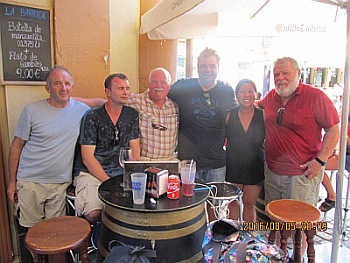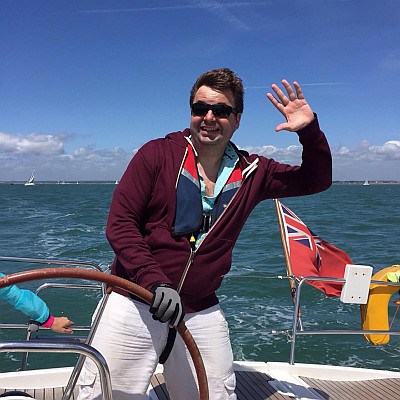Liveryman Richard Stewart, sailing in a Force 8 gale towards Barbate - running literally on diesel vapour - on a summer Yachting adventure in Spain....
Once a year I coach students at the EDHEC Business School in Nice on career choices and how to get jobs in management consultancies. The Head of Careers there suggested that because I enjoy sailing I go on a trip with her dad, John. She said he had been sailing in the Mediterranean every summer for the last 15 years, on board his 25 year old Beneteau. She described him as ‘73 years old, retired but very active as both a sailor and an amateur race car driver’. The name of the yacht was ‘Malandro’. I later learnt that the meaning of this word was derived from ‘Malandragem’, a Brazilian Portugese term for an ethos of idleness, fast living and petty crime – traditionally celebrated in samba lyrics. The other crew onboard the boat were his brother, Eric, who had never sailed before and was an internationally celebrated left-leaning poet and English literature professor from United States; an EDHEC MBA student, Jenny, who was American of Korean descent, recently married and with a background of cyber security in Washington who had sailed dinghies but not yachts; a couple of Irish guys whose background was in a successful organic farming business in Ireland and were experienced sailors; and Paul, working in Aerospace in the UK and was in training for triathlons and getting experience for sailing qualifications. Coming from Seville which was 38c at 8pm on the Thursday, I joined this diverse crew by train on a Friday afternoon in Cadiz, one of Spain’s oldest cities. Apart from Jenny, they had been sailing together for the last weeks and I learnt that evening that some of them were soon to finish their leg of the journey. We had an evening exploring the town whilst the yacht was moored up. We did a food shop for the provisions which included remarkably cheap red wine from the supermarket, which was less than a euro for a 1 litre box, and I was assured was very much drinkable when served chilled. We had a great view of the town from the top of the famous church tower. Then we ate a wonderful paella in the main square and I led some of the group in singing [Note from the Editor: Richard has a stunning bass voice! ] when we found Spanish guitarists who were happy for us to join in the music. That evening several of the crew warned me that John had a ‘certain way’ of doing things on the boat such as everyone taking their shoes off when entering the yacht and an ‘apero’ consisting of one beer and some snacks severed every day at 6pm, and it was best to just follow instructions directly and that his bark was bigger than his bite. I took note and looked forward to us setting sail in the morning.

The Crew in Cadiz before setting sail. (Richard 4th from Left)
John’s brother left to make his way home to the US and we set sail mid-morning and sailed West across the Gulfo de Cadiz towards Isla Cristina. The winds were light and we only managed a few knots an hour. We tried fishing for tuna with a simple line off the back of the boat but no luck and I was told that they had been attempting the fishing for several weeks already with no joy. In the evening we stopped for the ‘apero’ in a welcome ritual which was going to happen every day of the sailing. In watches we continued through the night. It got up to a windy force 5 during my watch and it was interesting handling this yacht for the first time from midnight on the high seas. The autopilot was only working intermittently so it was important to stay focused and wide awake. We reached Isla Cristina in the early morning where we started the sail up the Guadiana. This is an international river defining a long stretch of the Portugal-Spain border, separating Extradumura and Andalucia from Alentejo and Algarve. There were green forests and green farm yards on both sides of the river, although far less development on the Portuguese side and noticeably less golf courses. We reached our destination of Alcoutim in the late afternoon and parked the yacht on the Spanish side. We walked around this quaint town with its white cobbled streets, churches and windmills and then crossed on a river taxi to the Portuguese side of the river for dinner. It was a pleasant local seafood restaurant and they insisted on us having a strong local digestive drink after finishing.
Whilst it would have been enjoyable to have a few relaxing days on the beautiful banks of the Guadiana, John was working to a fairly tight schedule to get the yacht across the Mediterranean and back to Camargue in France and the Irish needed to head home after their leg of the journey. So after breakfast the following day, we sailed back down the river and overnight to Cadiz. There we restocked with provisions and made several trips to the local petrol station to take extra tanks of diesel for the long trip which awaited us, through the straits of Gibraltar. The Irish guys having headed home, there were only four of us left on the yacht and only three including myself had prior yachting experience. We anxiously checked the Shipping Forecast on the World Service as it said that there could be gales later in the region in the coming days, although there were very light winds where we were and given the schedule we left Port and made our way towards the Straits on a long sail. During the first several hours of the trip we needed to motor for several hours. We had the fishing line out and there was a moment of drama when a large tuna pulled on the line and started jumping into the air. We tried hard with the line to pull the tuna in but it broke free and escaped. We were encouraged by this near lucky encounter with the tuna but we noticed that there was a problem as the fuel was going down much quicker than it should do. It looked as if it was probably a hole in the main fuel tank and John rigged up a pump so that we could use the spare plastic tanks we had luckily filled up in Cadiz. That night the three of us took turns in watches to sail. It was very dark. with cloud covering the stars sometimes and we saw a lot of commercial shipping vessels passing by, probably coming out of the Straits we thought to avoid the gales there.
During the following day the wind got stronger and stronger. We reefed in the main sail and foresail to help stabilise the yacht. The sea state became agitated and we were using more and more fuel to push through the waves. The Shipping forecast was continuing to say that there were gales in the straits of Gibraltar and also coming to our sailing area. John recounted how he had once narrowly escaped disaster in the Straits, as the narrow channel there funneled the waves whipped up by the gales to terrifying proportions. We decided that it was unsafe to continue sailing onto the Straits and with our fuel running very low we would need to reach a harbor quickly for the evening. We sailed towards Barbate and in a force 8 gale proceeded to take down the foresail and main sail. This was quite tricky as myself and Paul had to clamber over the deck to reach the foresail and pull it down whilst the boat rocked everyway in the waves. At one point I was completely covered by the sail on top of me so the others couldn’t see me. Jenny was shouting out that she thought I had gone over the side and was relieved when she saw me reappear on deck! We limped into Barbate harbor under engine, hand pumping the diesel from the spare tank into the engine. Several times we thought the diesel had completely gone out which would have spelt disaster in those winds, but we eventually got to our designated spot on the harbor running, literally on diesel vapour.
The following couple of days were spent exploring a very windy Barbate, which was once the centre for the Spanish tuna industry. The gales were going to be in for several days and the fuel tank needed fixing so this was the end of the journey for me and there were other MBA students joining the crew from Seville for the next leg. John hired a car and drove us all to Seville, stopping at Jerez for a hearty breakfast on the way. Despite my yachting journey being cut short, it had been a great and memorable adventure, for the next days I had the opportunity to relax, explore, and enjoy sunny Seville on foot.

Liveryman Richard Stewart (emerged from troubled waters in Spain...)
Managing Director
Mindbench
www.mindbench.com T: +44 2070 899 017